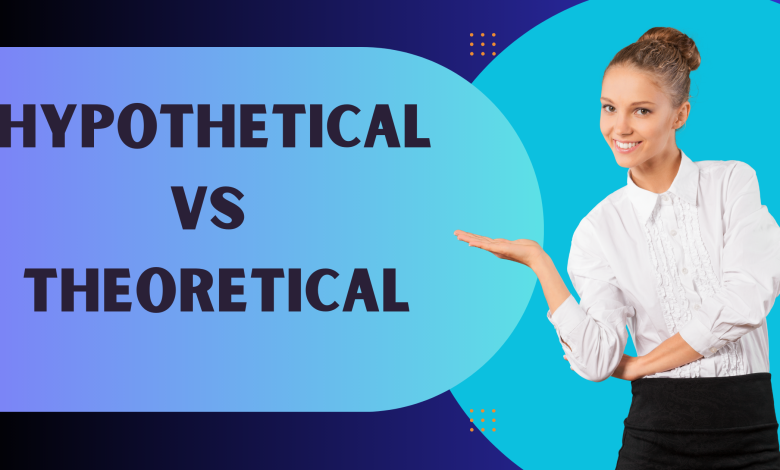
In the realm of discussions, debates, and academic inquiries, terms like hypothetical and theoretical often emerge, sometimes interchangeably. However, they hold distinct meanings and implications. Let’s delve into the nuances of each and unravel the differences between hypothetical vs theoretical concepts.
See more : iPhone vs Samsung
Understanding Hypothetical
Hypothetical situations are those that are based on assumptions or conjectures rather than facts. They serve as thought experiments or mental exercises to explore potential outcomes or scenarios. In essence, hypothetical situations propose “what if” scenarios that may or may not align with reality.
For instance, consider the scenario of a hypothetical alien invasion on Earth. While there is no evidence or certainty of such an event occurring, discussing strategies to deal with it can stimulate critical thinking and preparedness.
Understanding Theoretical
On the other hand, theoretical concepts are rooted in principles, frameworks, or models that explain observed phenomena or predict outcomes. These concepts are based on existing knowledge, empirical evidence, and logical reasoning. Theoretical frameworks provide a structured understanding of how things work within a particular context.
For example, the theory of relativity proposed by Albert Einstein revolutionized our understanding of space, time, and gravity. Despite being abstract, it has been substantiated by experiments and observations, solidifying its status as a cornerstone of modern physics.
Comparison between Hypothetical vs Theoretical
While both hypothetical and theoretical concepts involve speculation and abstraction, they differ in their foundations and applications.
Key Differences:
Hypothetical scenarios are based on assumptions or guesses, whereas theoretical concepts are grounded in established principles and evidence.
Hypothetical situations may or may not have real-world relevance, whereas theoretical frameworks aim to explain observed phenomena or predict future outcomes.
The Hypothetical thinking explores possibilities without the constraint of existing knowledge, while theoretical thinking seeks to deepen understanding within a defined framework.
Similarities:
Both involve abstract thinking and imagination.
They play crucial roles in scientific inquiry, philosophical discourse, and creative endeavors.
Both serve as tools for problem-solving and exploration of ideas.
Importance and Applications
Understanding the distinctions between hypothetical and theoretical thinking is essential for various fields, including science, philosophy, and literature. Hypothetical thinking encourages creativity, innovation, and the exploration of alternative scenarios. It fosters imagination and helps individuals anticipate and prepare for potential future events.
Theoretical frameworks, on the other hand, provide a systematic approach to understanding complex phenomena and making predictions. They form the basis for scientific research, technological advancements, and academic discourse. By elucidating underlying principles and relationships, theoretical models empower scientists and scholars to expand human knowledge and address pressing challenges.
Misconceptions
Despite their significance, hypothetical and theoretical concepts are often misunderstood or misrepresented. One common misconception is equating hypothetical scenarios with pure speculation devoid of value. In reality, hypothetical thinking serves as a valuable tool for brainstorming, problem-solving, and hypothesis generation.
Similarly, theoretical frameworks are sometimes perceived as abstract and detached from reality. However, many theoretical concepts have practical applications and contribute to advancements in various fields, from physics and chemistry to psychology and economics.
Conclusion
In conclusion, while both hypothetical vs theoretical concepts involve speculation and abstraction, they serve distinct purposes and operate within different frameworks. Hypothetical thinking explores potential scenarios and possibilities, while theoretical frameworks provide structured explanations for observed phenomena. Understanding the differences between these concepts is crucial for fostering critical thinking, advancing knowledge, and addressing complex challenges in diverse domains.
FAQs
Are hypothetical scenarios purely speculative?
While hypothetical scenarios are based on assumptions, they serve valuable purposes such as problem-solving and hypothesis generation.
Can theoretical concepts be proven definitively?
Theoretical concepts are supported by evidence and experimentation but may evolve over time with new discoveries and insights.
How are hypothetical and theoretical thinking applied in scientific research?
Hypothetical thinking aids in hypothesis formulation, while theoretical frameworks provide the basis for experimentation and data analysis.
Are hypothetical and theoretical thinking exclusive to academic disciplines?
No, both are applicable in various contexts, including everyday decision-making, creative endeavors, and problem-solving.
What role do hypothetical and theoretical thinking play in innovation?
They stimulate creativity, encourage exploration of new ideas, and provide frameworks for developing novel solutions to existing challenges.




One Comment